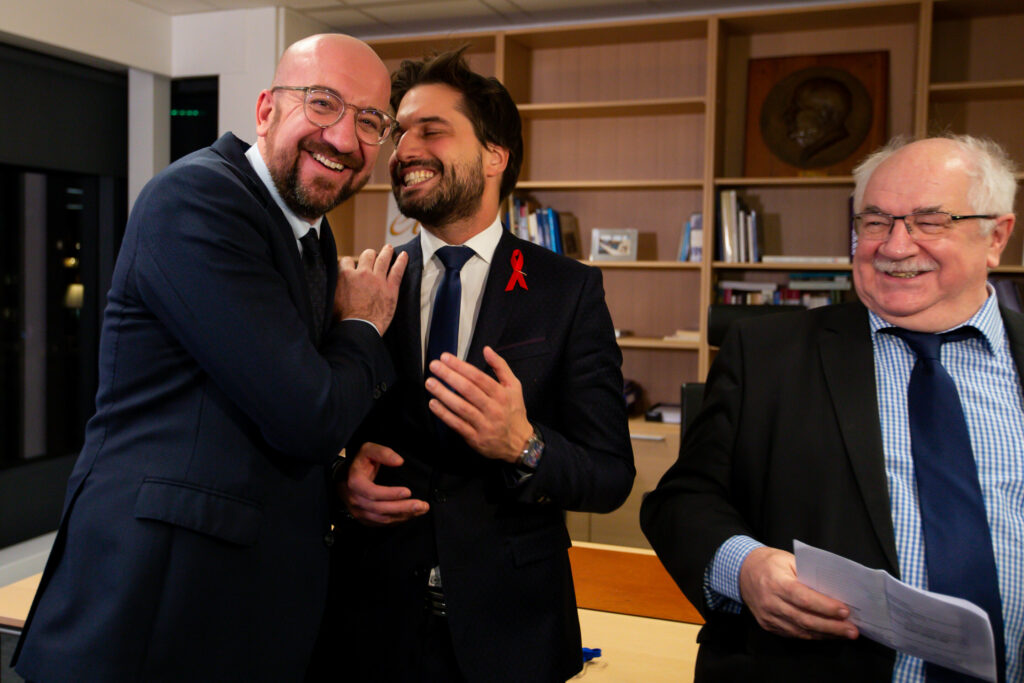With exactly two weeks before Belgians cast their votes in the June 9 national election, a major poll of the country's francophone voters indicates major gains for the Francophone liberal party Mouvement Réformateur (MR), now on track to be the leading party in this language community.
When Georges-Louis Bouchez took over as the party's leader in 2019, the then-33-year-0ld promised to secure 30% of the vote from Belgium's French speakers – a bold aim that would effectively make MR the biggest party by a sizeable margin. Known for his audacious – sometimes brash – politics, the latest polls indicate that MR has not yet achieved this mission; however the party is firmly ahead of rivals, most notably the Socialist Party (PS).
The most recent edition of the regular survey (conducted by Ipsos pollsters in collaboration with Belgian media Le Soir, RTL Info, Het Laatste Nieuws and VTM) was published on Friday and showed that the economically-conservative MR is now level with PS – a traditionally socialist region – in Wallonia, where both parties have 22.6% of the voting intention.
But in Brussels the rise of MR is even more marked, where it is well ahead of rivals for the francophone vote. In the Capital Region, MR now has 23.3% of the voting intention, despite gains also from the second place PTB-PVDA (the radical left Workers' Party and the only fully national party in Belgium).
Yet despite an enviable lead for his MR party, Bouchez himself is less popular than other politicians. Among French-speaking voters the most popular individuals are former Prime Minister Sophie Wilmès (MR), current Prime Minister Alexander De Croo (Open Vld), and Paul Magnette, the leader of PS.

Former Belgian Prime Minister and MR chairman Charles Michel with newly-elected MR chairman Georges-Louis Bouchez, November 2019. Credit: Belga
The biggest losers?
The progress for Bouchez' party has come predominantly at the cost of the green party Ecolo, which looks set to make heavy losses. Whilst the environmentalists secured 21.6% of votes in Brussels in the 2019 election, the party is now predicted just 12.5% of the vote; in Wallonia it stands to fall from 14.9% in 2019 to 8.8%. The party has a history of suffering electoral losses after a term in the Federal Government. The poll currently places Ecolo fifth in Wallonia and fourth in Brussels.
MR will also take confidence from the loyalty displayed by its voters in 2019: of these former supporters, 78% in Brussels intend to vote for MR this year; in Wallonia this is true for 70% of 2019 MR voters. In terms of voter loyalty, MR is clearly the best-performing of francophone parties.
Related News
- Nearly all political parties in Belgium moving to the right
- Bouchez-Hedebouw debate: PTB and MR disagree on everything, except tax reform
In Flanders, the far-right Vlaams Belang leads with 26.8% of intended votes. The right-wing N-VA is in second place with 20.6% whilst centre-left Vooruit has rebounded with 14.3%; Christian-democratic CD&V is fourth with 12.2%. Notably, though not typically popular in Flanders, the radical left PTB-PVDA has been focussing campaign efforts in Flanders and the results show in polling, with the party now on course for 8.9% of the Flemish vote – overtaking Prime Minister Alexander De Croo's party Open Vld (8.2%) and Groen (6.6%).
Among Flemish voters the most popular figures are Bart De Wever, the leader of the N-VA, Hilde Crevits, the Deputy Prime Minister (CD&V), and Alexander De Croo.
Importantly, almost one in three voters are still not sure who they will vote for in two weeks. The level of indecision was especially high in Wallonia (33%). It grows even more among certain voter groups: 37% of women are undecided on who they will vote for in the federal elections whilst just 22% of men are. The gap between ages is even greater: 40% of young voters don't yet know which party they will vote for; for voters over 55, this falls to 22%.
The survey was conducted online between the 14 and 20 of May. Ipsos interviewed 3,600 Belgians (2,000 from Flanders, 1,000 from Wallonia, and 600 from Brussels). The maximum margin of error is estimated to be 2.2% in Flanders and 4% in Wallonia and Brussels.

